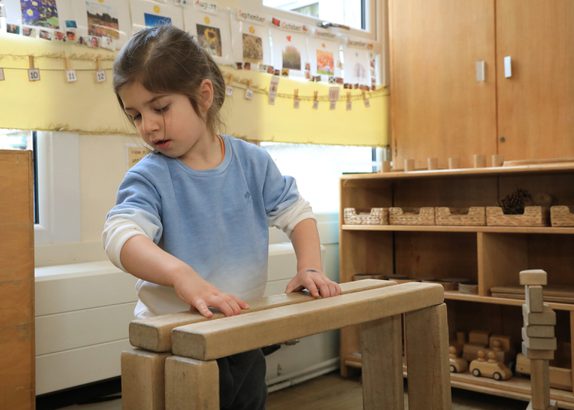Sacha Powell, CEO, Froebel Trust reports on the Celebration of Blocks live webinar. Recording now available to watch online.
Sacha Powell, Chief Executive Officer, Froebel Trust reports on the Celebration of Blocks live webinar held on 21 October 2020
I'm certain that Friedrich Froebel would have been overjoyed to have listened in to the webinar, A Celebration of Blocks led by Jane Whinnett with guest contributors, Dr Jane Read, Catriona Gill and Professor Tina Bruce. He would have been in the company of more than 400 participants from across the UK as well as South Africa and China to name but a few places where Froebel’s Gifts, such as wooden blocks, continue to inspire and enthral children and educators.
Introducing her new pamphlet, Froebel’s Gifts and Block Play Today, Jane Whinnett discussed the process of writing and illustrating her ideas with carefully chosen photos, with support from the experienced editor of the Froebel Trust pamphlets series, Jane Read.

We heard about children’s construction play before Froebel’s birth – ‘since the dawn of time’ – as well as the origins and complex, mathematical thinking behind Froebel’s Gifts 3-6. Jane Read provided provocative photographic evidence of 19th century, teacher-controlled construction using wooden blocks in elementary school instruction, which bore no resemblance to Froebel’s pedagogic ideals. So different from the block play evidenced in Jane Whinnett’s practice pamphlet, which reconnects (Bruce, in press) Froebel’s philosophy to contemporary play and interpretations of learning that experienced Froebelian educators observe, support, extend, document and discuss.
Jane Whinnett and Catriona Gill showed how contemporary block play is steeped in creativity that relies on children having time and space to develop as autonomous players with informed, observant educators who understand the vast and varied possibilities that block play offers for young children’s learning. While the ‘stages of block play’ can provide a framework to help educators recognise, understand, support and extend children’s creative endeavours, they are not linear; they are like a dance in which the movement is dynamic and multi-directional. The stages offer one theoretical model for observing, analysing and explaining children’s learning and development.
Unlike many other resources that dictate a form, function or purpose ‘blocks are neutral’. They have obvious affordances for the development of mathematical, spatial or ‘STEM’ skills; they support the development of abstract ideas, which are represented through construction. Blocks can be made to symbolise anything that a child wishes and develops the ability to represent from their real life experience and their boundless imagination: a construction is a xylophone for one child, a tunnel for another. And the negotiation of meaning offers opportunity for social and emotional development. Blocks provide landscapes and tools for dramatic role play. And let's not forget the dexterity, planning, trial and error, perseverance, dismays and triumphs involved in creating and modifying complex constructions!
Tina Bruce recalled the important work of Chris Athey and Pat Gura whose teams helped to bring greater understanding of meaningful block play to many children, educators, families and the wider world of early childhood education. Of course Tina’s own work has also helped countless educators to disentangle complex ideas and to decode difficult vocabulary and she has ensured that Froebel’s Gifts, including blocks, remain current and relevant for 21st century early childhood education.
It’s impossible in a short blog to convey the extent and depth of expertise and information that was shared about block play in this inspirational webinar. So why not take the opportunity to watch the video recording of the event and download a free PDF copy of Jane Whinnett’s pamphlet.
21 October 2020


